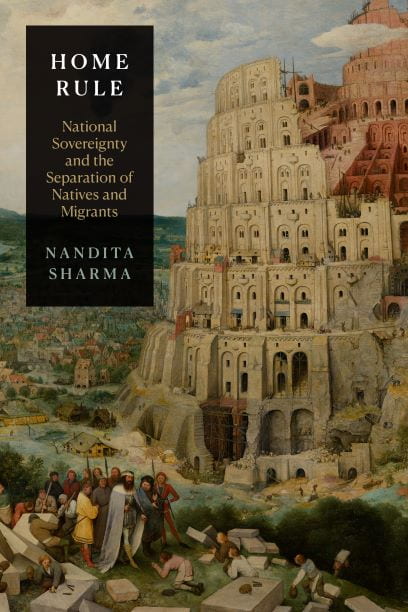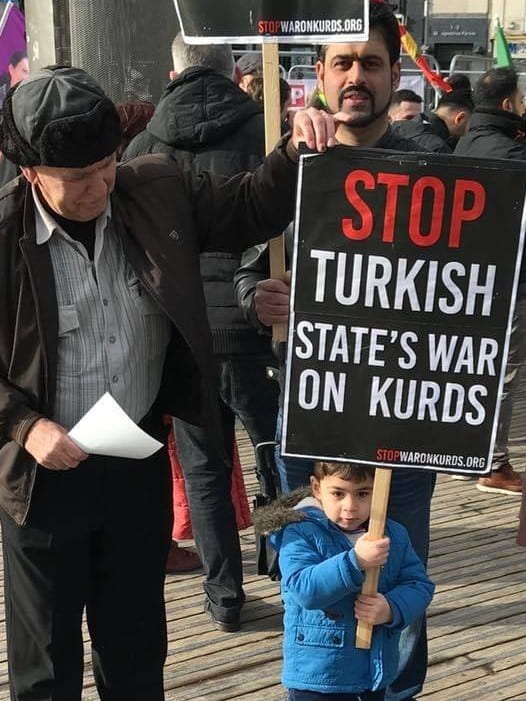Race, nation and migration – the blog series reframing thinking on movement and racism.
By Nandita Sharma.
A focus on migration, mobility and ideas of ‘race’ are crucial aspects of nationalist thought and practice. Indeed, today, racism operates through nationalism. Yet, while racism has been largely delegitimised, nationalism has not. The delegitimisation of racism does not mean that it no longer exists. Quite the contrary: racism continues to deform our lives but is not, for the main part, carried out through laws that categorise people into distinct ‘races’ who are singled out for negative, discriminatory treatment. It is common for most people espousing racist views and actions to run away from the label ‘racist’ and, instead, to insist that they are anything but.
Case in point: early on in his presidency, former-US President Donald Trump, in response to questions posed by ITV host Piers Morgan, argued that, ‘I’m the least racist person anybody is going to meet.’ Trump insisted upon this in reference to his re-tweeting of three videos made by a group called Britain First in November 2017. Britain First, whose name is congruent with Trump’s own slogan of ‘America First’, is a fascist political organisation formed in 2011 by former members of the British National Party. Their motto, ‘Britain First: Taking Our Country Back’, is largely aimed at legitimising the violent targeting Muslims living in the UK, many of whom are British citizens. As the Washington Post reported, ‘in the case of these three videos, the intended message seems to be that “Muslims are dangerous people.” But these videos appeared to be selected at random, offered without context or original sourcing, and are months, if not years, old. They depict people who may or may not be Muslim, inflicting harm on people who also may or may not be Muslim.’ It added, ‘this is what propaganda looks like.’
In Britain First’s and Trump’s own ‘America First’ rhetoric, as well as in all its other manifestations, what grounds racism is nationalism. Nationalism spatialises and territorialises ideas of ‘race’ by transforming the land (and water and air) that provides the basis of people’s ability to live into the territory of a nationally sovereign state. While state practices of territorialising land is an integral part of what states do (even when the territory is not always clearly mapped out), nationalism fuels claims that there exists some sort of natural link between a specified group of people (i.e. The People) and a certain specified place. Consequently, each ‘nation’ imagines that it has its own place on earth.
In Home Rule: National Sovereignty and the Separation of Natives and Migrants (2020), I investigate how the current political order of nation-states institutionalises the notion that each ‘people’ has its own place in the world by limiting access to national citizenship and authorised immigration.
This national regime of governmentality, which I term the Postcolonial New World Order, co-opted radical anti-colonial demands and replaced them with demands for national sovereignty. Calls for ‘national self-determination’, I argue, perverted demands for the return of expropriated land and for the freedom of labour from exploitative class relations. Instead of decolonisation, people got the postcolonial rule of nation-states. Nationally sovereign states have not only continued the work of imperial-states to organise the global accumulation of capital, their policies (both ‘domestic’ and ‘foreign’) have led to the enormous expansion of such practices. Since the start of the Postcolonial New World Order, more people and more land (and air and water) have been brought into capitalist social relations than ever before. Hardly an inch of our world has been spared. Under the rule of postcolonialism, disparities between the rich and the poor – and between Rich and Poor Worlds – have intensified.
In the Postcolonial New World Order, the national mechanism of limiting rights and entitlements according to one’s citizenship and immigration status not only organises racism but also legitimises it. We live in a system of global apartheid, one that rarely codifies ‘race’ in the law but relies instead on ideas of the ‘right’ of national sovereigns to determine membership in the national political community. There is very little outcry of this legislated system of discrimination and injustice even though, as economist Branko Milanovic (2015) points out, one’s nationality is the single-most consequential factor in predicting how well and for how long one lives. In this postcolonial world of nation-states, who gets to be a ‘national’ – and who does not – is therefore an important and hotly contested site of political struggle. In this sense, anti-immigration politics is a structural component of the Postcolonial New World Order and it takes many guises.
Today, across the world and across the Left-Right political spectrum, nationalism is hardening. For a growing number of people and polities, it is not enough for one to be a citizen (even as citizenship becomes more difficult to obtain or even to keep); one must also be seen to be a member of the Native people of the nationalised ‘soil’. By mobilising a discourse of autochthony (or native-ness), today’s National-Natives contrast themselves against allochthons (or people from someplace else). Because of their association with mobility, the figure of the Migrant becomes the quintessential non-Native and is portrayed as being ‘out of place’. Mobility is not really the issue as people can be made into Migrants regardless of whether they have ever left the nationalised territory under question. What matters is the racist idea of ‘blood’ (now sanitised through terms like ‘indigeneity’ or ‘ancestorship’ or ‘genealogy’). Across the world of nation-states, disputes over land, water, jobs, voting rights, political office and more are being fought over who is and is not a National-Native.
We can see this in the politics of Britain First or America First. Britain First is a political party whose ‘principles’ include a commitment: ‘to preserving our British cultural heritage, traditions, customs and values.’ These, they believe are under threat by ‘immigrants’ (many of whom are, in fact, co-British citizens). Britain First views immigration to be the ‘colonisation of our homeland’, which weakens the Christian ‘foundation of our society and culture.’ A large part of Britain First’s activities appears to be ‘mosque invasions’ where, under the banner of ‘no more mosques’, ‘they confront imams and worshippers, insisting they accept copies of army-issue bibles.’
But it is not only on the far-right that we see such politics. The legal and/or social separation of National-Natives and Migrants animates deadly conflicts around the world from what is widely seen as the world’s latest genocide in Myanmar (formerly Burma) to one of the best-studied examples of recent genocides, the 1994 Rwanda genocide. In both nation-states, the violence is instituted by those constituting themselves as National-Natives fighting threats to ‘national society’ by ‘colonising Migrants.’ In less lethal but still highly consequential fashion, the nationalist politics of autochthony is evident in struggles over who is and is not a member of ‘Indigenous Nations’ in Canada and the US.
Yet, however much nationalists proclaim that whoever they see as their members are ‘equal,’ nowhere is this true. Nevertheless, the nationalist myth that, ‘we are all in it together’ remains the cross-class rationale for national sovereignty. Because there needs to be some reason that ‘we’ members of the ‘nation’ remain unequal, nationalisms rely on racism and sexism to mark those who are said to be the cause of all national miseries. Nationalists maintain that ‘we’ would all be well-off were it not for outsiders ruining ‘our nation’. This is what gives constant life to evermore vociferous anti-migrant policies.
Nandita Sharma is an activist scholar and Professor at the Sociology Department at the University of Hawai’i at Mānoa. She was invited to be a Benjamin Meaker Distinguished Visiting Professor at the University of Bristol in 2020 but postponed the position due to the global COVID-19 pandemic.
You can purchase Home Rule: National Sovereignty and the Separation of Natives and Migrants (2020) through the publisher, Duke University Press, or through your local, independent bookseller. In the US, Bookshop is a good alternative to Amazon.
Nandita also featured on the MMB Insights and Sounds 2021 series, talking to Bridget Anderson about ‘What do immigration controls have to do with Empire?‘






